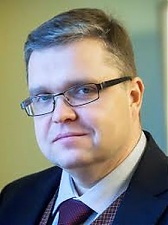Banks, Direct Speech, Financial Services, Lithuania, Markets and Companies
International Internet Magazine. Baltic States news & analytics
Saturday, 27.04.2024, 00:18
Lithuanian c.banker: we live in an era of revolutionary change
 Print version
Print version |
|---|
The chairman of the Bank of Lithuania's board said in an
interview with BNS that Lithuania is actively positioning itself as a country
favorable for setting up and operating fintech businesses and it is also seeking
to become a center for payments between China and the European Union.
"We have been very actively advertising Lithuania as a
jurisdiction. With some companies searching for alternatives in the light of
Brexit, there has been a noticeable interest in Lithuania," he told BNS.
Lithuania presents
itself as a payment center and takes active efforts to attract Chinese
investors into this area. Why?
Vitas Vasiliauskas:
Lithuania is a small but ambitious and hungry nation. When you are a member of
the euro area, you can do everything all other central banks in the euro area
can, but if you want to compete, you have to do something differently,
something to stand out. I believe that the EU-China relationship has prospects
for development. Trade relations are developing dynamically, and where there is
trade, there is also financing and payments. I do not see why Lithuania could
not be a point between the two reserve currencies. This is the area we are
working on.
Poland has received
considerable Chinese financial sector investments, including conventional and
investment banking.
V.V.: The banking
sector normally follows its clients. Chinese companies are active in the Polish
market, which makes it interesting to Chinese banks, too. This is China's state
policy. Our nation is too small for the Polish model to work here. We can only
be intermediaries. We should all understand that.
Another strong
commercial bank was expected to come to Lithuania. Can we still expect this to
happen?
V.V. Let's be
realistic. The Baltic market is not large. So, it is these new innovative
players, mobile, online banking (providers) that we can expect to come to our
countries.
One of these players
is Britain's Revolut, which has declared intentions to obtain a specialized
bank's license. How is it doing?
V.V. To our
knowledge, they are still in the stage of intention. They are interested but
have made no headway yet. The idea of a specialized bank is appealing. We do
have many of those interested in it. Our specialists meet almost every week
with interested parties from foreign countries, who are interested in setting
up a business in Lithuania and developing it all across Europe. The number of
those contacting us has increased several times, particularly as regards
investors from abroad.
When could this
interest translate into a breakthrough?
V.V.: We can see
that the message about Lithuania has been spreading at a fast rate. Foreign
financial sector associations recommend us to their members and so do companies
that have already obtained or are considering obtaining a license here; we are
drawing interest from the foreign media. We are currently examining 15
applications for setting up fintech or other financial institutions that would
compete, in one or another way, with conventional banks. More than a half of
them are foreign investors -- starting with Israel, Germany and Britain and
ending with Singapore and other countries. I believe we can expect some new
players to come this year.
Banks in Lithuania
left the initiative of creation an instant payment system to mobile operators.
How do you explain their decision?
V.V. I'd
highlight several aspects. Instant payments are a hobby-horse of banks, at
least in some Scandinavian countries, but the habits of their population differ
from ours, too. Also, many banks operate in all three Baltic countries, not to
mention the Scandinavian countries, which makes it difficult to find any
horizontal solution, especially given that the banking groups are trying to
make all processes as horizontal and universal as possible. I'd say that mobile
operators are simply more flexible in this.
Do you think the
system that is being developed in Lithuania could also become a common standard
in Latvia and Estonia?
V.V. I think
everybody would benefit if we had some kind of horizontal solutions for all
three Baltic countries. What is good is that the same operators are present in
all Baltic countries; on the other hand, it will be easier to speak to Latvians
and Estonians when we have a ready product. In the meanwhile, the test lab is
here in Lithuania. In the area of supervision, we do cooperate with the
neighbors. Certainly, we should speak about having a single standard, because
creating parallel structures in such a small market as Lithuania or all Baltic
countries is too costly.
New opportunities
lead to the emergence of new risks.
V.V. They
certainly do. New technologies are primarily related to cyber risks, customer
identification, and the admission of the non-banking sector, new intermediaries
in the payment systems. We see those risks and invest in preventing them, but I
also have no doubt that we will have some incidents. We need to get ready for
this, not to be afraid of communicating this to the public, and to be
transparent about this.
We live in an exciting era of transformation and what seemed
inconceivable yesterday becomes a reality today. Could anyone have imagined
five years ago that cars would be able to drive themselves? Probably not. The
same holds true for the financial sector. A revolution is underway. Earlier, we
perceived ourselves as spectators at the cinema. What we need to understand now
is that we are among the actors.








 «The Baltic Course» Is Sold and Stays in Business!
«The Baltic Course» Is Sold and Stays in Business!

